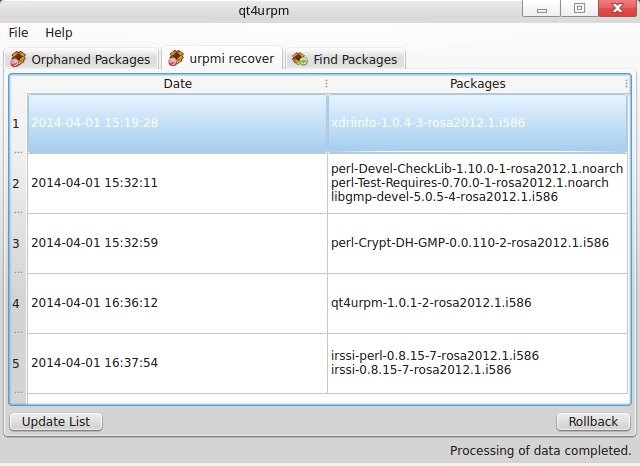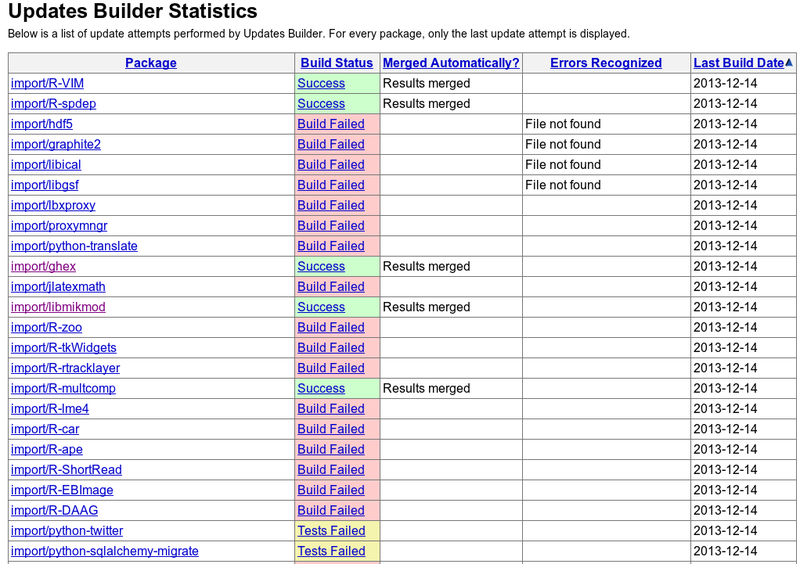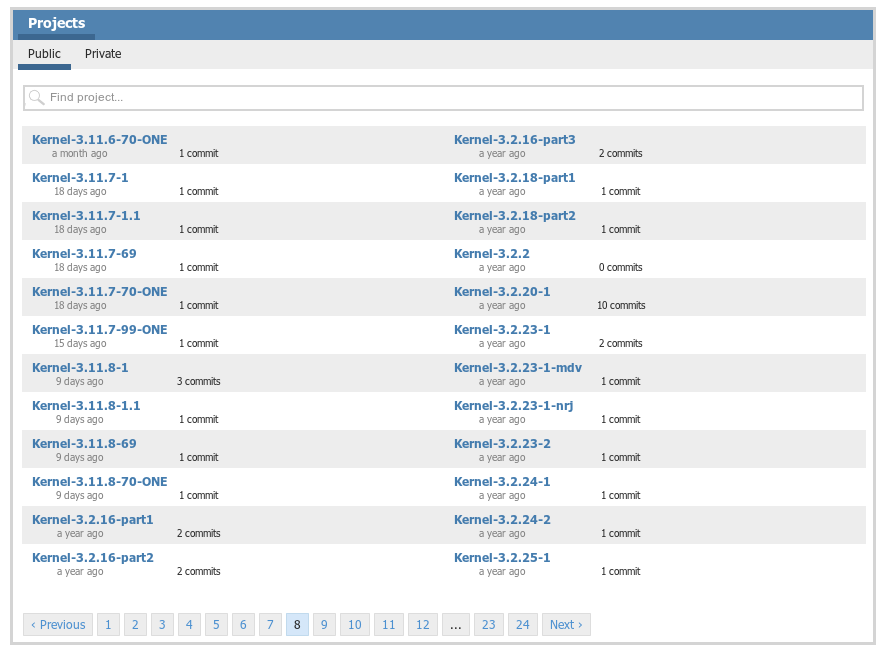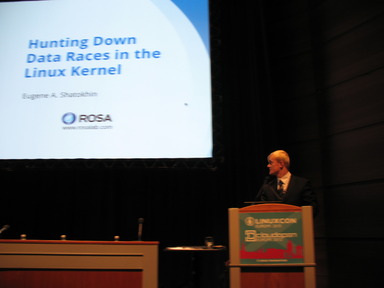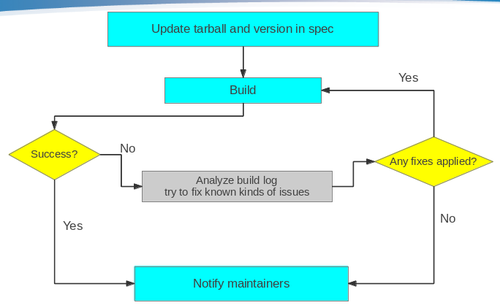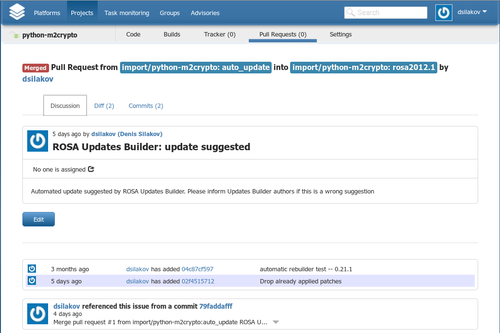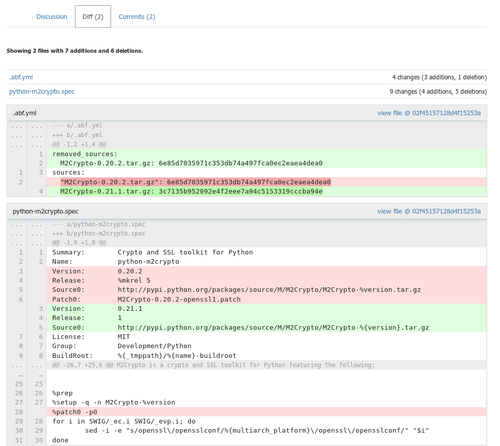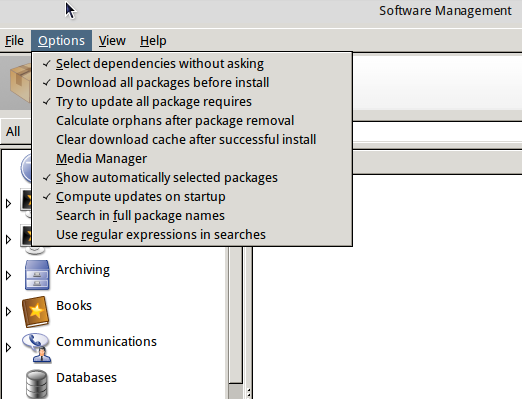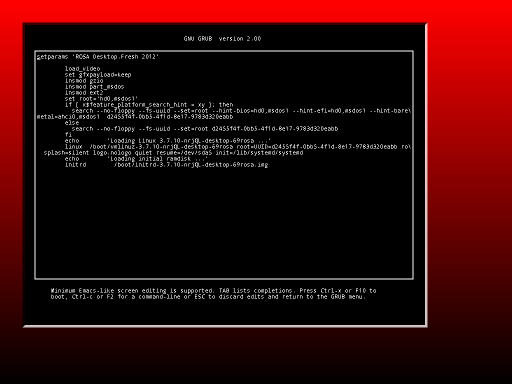Блог:ROSA Planet
A technical blog of ROSA Laboratory.
All content is published under Creative Commons Attribution-ShareAlike 3.0 License (CC-BY-SA)
Links
Please, subscribe to RSS/Atom feed. If you have any questions do not hesitate to contact us
Usage of our developer tools in upstream
During the development of operating systems, our developers and maintainers use a huge variety of program tools (in order to build packages, analyze code quality, verify changes in code, etc.). Most of the tools are available in almost any repository, such as, for example, rpmbuild, gcc, rpmlint, check, valgrind, diff, etc. But sometimes there are tasks for which tools have not yet been created. In such cases, we create our own tools for developers. If these tools can be helpful not only for us but also for the community, then we publish their source code.
An example of one of the non-standard tasks was to analyze the backward API/ABI compatibility of system libraries in our operating system ROSA. Because the number of libraries in the system reaches several thousands, the manual tracking of changes was too difficult task. Therefore, we have developed the ABICC tool, that can automatically analyze the compatibility of changes in libraries. The source code of this tool have been published and gradually more and more upstream developers use this tool to control API/ABI compatibility of interfaces in their libraries. As a result, our maintainers can easier update appropriate packages for such libraries.
Examples of libraries successfully using our tools are: Pacemaker, MySQL++, Wireshark, Glibc, Enlightenment, libDAP++, libapt, Barry, PySide, PLplot, etc. Also, quite a number of library developers prefer to use our special service Upstream Tracker, where they can be free add any library and monitor changes in its API/ABI interface. Examples of such libraries are ImageMagick, V8, etc.
Our most popular open-source tools for developers can be found here. Among them are the following tools:
- ABICC
- a tool to check backward API/ABI compatibility of system libraries.
- PkgDiff
- a tool to classify files and visualize changes in source packages.
- Java ACC
- analogue of ABICC for Java libraries.
- API Sanity Checker
- an automatic generator of automatic unit tests for C/C++ libraries.
- ABI Dumper
- extract ABI structure from the debug-info of a shared library.
- Vtable Dumper
- list content of virtual tables in a shared library.
We encourage upstream developers to use our tools. This can improve the quality and stability of their API/ABI interfaces. And moreover this simplifies updating of appropriate packages in operating systems.
ROSA Desktop Fresh R3 KDE
Good news, everyone!
ROSA Desktop Fresh R3 release is out with KDE desktop environment.
ROSA Desktop Fresh R3 is a regular update of the ROSA Fresh platform. The R series of distributions is targeted to those users who looks for fresh and full-functional software. This series is developed by ROSA with significant help of community. The release includes all updates, fixes and improvements implemented since the time the previous R2 version was released.
Users who already work in ROSA Desktop Fresh R2 are able to update their systems to ROSA Desktop Fresh R3 from official repositories.
Newbies can easily download and try it, without reading the notes below.
GUI for urpmi.recover
Last week we introduced urpmi.recover - a tool able to rollback the state of your system's package base. The new tool is already used actively and we have got a lot of useful feedback and fixed some issues.
One of the main concerns with urpmi.recover is that it is not very convenient to select a date or number of transactions to be reverted using command-line interface. To solve this problem, we quickly implemented a simple GUI for urpmi.recover; to be more precise, we have extended qt4urpm to support the new tool.
Qt4urpm is a small program developed several years ago by members of MandrivaUser.de community to perform two operations with urpmi repositories - file search and orphan detection and removal. To be sure, such a functionality is partially provided by Rpmdrake, but qt4urpm is much more lightweight (it is written in Qt) and faster. Despite its simple interface, it is sometimes is even more functional than Rpmdrake - for example, by means of qt4urpm you can remove only selected orphan packages. And when working with qt4urpm, you will rarely need to perform more than three mouse clicks.
So we have decided that a simple and straighforward GUI for urpmi.recover will perfectly fit in qt4urpm, and it didn't take much time to implement this. Install the freshest version (2.0) of qt4urpm, launch the program and select the urpmi.recover tab. Here you will see a list of transactions sorted by date. For every transaction, a set of packages is displayed which were installed during it:
Now select any transaction and press Rollback - urpmi.recover will revert all transactions starting from the selected one. That's all, folks:)
Maybe in future our GUI experts will implement something more beautiful, but from functionality point of view, qt4urpm already provides all the information you need to play with you package base state. We hope that it will help you to avoid getting lost in rpm transactions and to feel more comfortable when rolling back your system to some date in the past.
Spec-cleaner and rediff patch - New Helper Scripts for Maintainers
Maintainers' work includes a lot of routine tasks — adoption of spec files to match evolving packaging policies and build tools, adoption of existing patches for new upstream versions, update of package file lists and so on. Some of such tasks are performed automatically by build tools — rpmbuild itself and auxilliary scripts from spec-helper package. However, these scripts by design can’t solve a lot of problems — in particular those that require modification of spec files.
To simplify maintainers' life a little more, we have included two new scripts to the spec-helper package. The scritps' names are self-explaining — spec-cleaner and rediff_patch. These scripts are not launched automatically during the build; they are intended to be used by maintainers manually. Update spec-helper package in your system and you will get these scripts in your /usr/bin.
Spec-cleaner performs the following actions:
- removes obsolete declarations that makes no sense nowadays — for example, definitions of BuildRoot and Packager, requirement on install-info, buildroot cleanup and so on;
- modifies formatting of macros and variables — according to our policies, variables in spec files should be emraced with braces — %{const}, while for macros braces should not be used — %{macro}. Note that spec-cleaner only reformats macros and variables known to it. If you have some entities defined by your own, the script will leave them «as is»;
- formats Summary — capitalize the first letter and removes the dot from its end;
- removes explicit declarations of %{name}, %{version} and %{release} variables;
- replace obsolete macros with modern analogues;
- … and performs a lot of other small tasks which will help to make spec files smaller and cleaner and avoid claiming from rpmlint.
When developing spec-cleaner, we try to avoid situations when the new spec-file becomes incorrect in some sense. Due to this reason, some spec-file issues that may seem to be easy to fix are not automatically fixed yet.
Meanwhile, old developers may notice that spec-cleaner is a modern and much powerful analogue of old macroszification script which was present in spec-helper for years. Now this script is dropped — use new spec-cleaner instead.
As for Rediff_patch, then you have likely guessed that it tries to rediff an existing patch against a new tarball with source code. Please read the instructions below carefully before trying to use this script:
- rediff_patch should be launched in the folder of a cloned Git project, where spec file and patches reside. Spec file is used to determine how the patch should be applied;
- the new tarball should be placed in the same folder;
- the script should be launched in the following way:
rediff_patch <patch_ro_rediff> <tarball>
If you folder contains only one tarball, then you can omit second argument.
During its work, rediff_patch creates rediff_patch folder, unpacks tarball into it and tries to apply the patch to the unpacked content. To apply the patch, it uses parameters extracted from the spec file, but adds «--force» option and uses default system value for the «fuzz» option (remember that rpmbuild uses «--fuzz=0» by default). Currently the script only handles situation when tarball has a single top-lever folder; it will reject to work with tar bombs
If everything goes fine, then you will find a new patch (with the «.new» suffix) near the old one. rediff_patch folder with the whole content will be removed.
If something goes wrong (e.g., patch was applied only partially and some hunks failed) then you will be left with rediff_patch folder containing two subfolders — the original one and the new one, where a patch was tried to be applied So you will be able to analyze the reasons of failures and finish rediff manually.
As our practice shows, in reality most patches fail to rediff completely automatically, even with «--force» and more soft «--fuzz». But even rediff_patch managed to prepare a new patch for you, do not forget to check this patch carefully — '--force' sometimes leads to undesired results. But even if rediff_patch failed — well, at least we have saved some time, since it has unpacked tarball for us and performed a first attempt to apply the patch.
We hope that these two new scripts will make your life a little easier. Both scripts are easy to use and straightforward. As usual, comments, suggestions and patches are welcome.
Urpmi.recover - "Back In Time" For The Package Base
Many developers and advanced users often meet a need to rollback recently installed packages that introduced some undesirable updates to their system. this usually happens when you install packages from third party or testing repositories or from private repositories and containers where maintainers perform test builds of their packages. The latter case is quite common for ROSA QA team whose members often meet a need to rollback a set of packages installed for testing purposes.
Manual rollback is not very convenient, especially if the number of packages is huge and you are not completely sure which of them should be erased or downgraded to return system to a full-functional state. To be sure, in many cases all problems can be solved by urpm-reposync, but sometimes this tool is too powerful — it performs complete synchronization of your system and enabled repositories and it’s not easy to rollback only several packages.
A good news that now a niche between manual rollback and reposync usage is filled by urpmi.recover tool which is able to rollback your package updates. Urpmi.recover will help you to rollback your package base to certain date in the past or just rollback a given number of transactions.
Urpmi.recover is included in urpmi package and will be installed to your system with regular updates.
To be able to perform such a rollback, urpmi.recover stores old versions of updated packages in /var/spool/repackage folder. To start use the tool, you should first initialize the backup of old package versions by typing
# urpmi.recover --checkpoint
By typing this command, you say: «Currently my system is in stable state, but I am going to install dangerous updates. Please, starting from this moment, track all newly installed packages and backup the old versions in case of updates».
You can also run this command at any moment in future to rebase the stable system state. Every invocation of urpmi.recover --checkpoint will clean the /var/spool/repackage folder, so you won’t be able to rollback to earlier dates.
While package updates tracking is enabled, old versions of updated packages are stored in /var/spool/repackage subfolders corresponding to update date, so you can always rewise these old versions by yourself.
At some moment when you decide that it is time to revert your packages (at least to try to do it:)), simply say something like:
# urpmi.recover --rollback <timestamp>
You can specify timestamp in «seconds since the Unix Epoch», but feel free to use human-readable formats, e.g.:
# urpmi.recover --rollback "2014-03-07 13:20:47"
or even
# urpmi.recover --rollback "1 hour ago"
You can also rollback a given number of transactions by specifying --transactions option and passing number of transactions to be reverted to --rollback option:
# urpmi.recover --transactions --rollback <number_of_transactions>
For example, if you just updated a package a want to rollback this update, you can tell urpmi.recover to revert a single transaction:
# urpmi.recover --transactions --rollback 1
Finally, to completely disable repackaging and to clean /var/spool/repackage folder, just type:
# urpmi.recover --disable
This command will also clean up the /var/spool/repackage folder.
So these are the ways you can use urpmi.recover to rollback your package base. The tool is in experimental stage; we don’t guarantee absence of aerrors, so use it on your risk. though it should be said that before performing the rollback, urpmi.recover will provide you with details — which packages it is going to drop and which ones to downgrade, and you will be asked for confirmation. Finally, you can always use urpm-reposync in case of emergency.
One should also remember that maintainers usually don’t care about possibility to correctly downgrade their packages. So if new version of a package introduced some problems to your system, it is not necessary that rollback to a previous version will help to bring your system to a functional state.
Multiboot flash drive with several ROSA editions
Want to have a single flash drive able to boot several editions of ROSA? Sergey Zhemoitel provides a set of instructions on creating a multi-boot flash drive with several ROSA editions using grub4dos.
As an example, we will setup a flash able to boot 32bit and 64bit images of ROSA Desktop Fresh KDE. We assume that /dev/sdX is a device corresponding to your flash drive.
- Install grldr.mbr to flash MBR:
dd_rescue grldr.mbr /dev/sdX
- Create two partitions using fdisk or diskdrake:
- /dev/sdX1 - 200 Mb
- /dev/sdX2 - the rest of the device
- Format partitions:
- /dev/sdX1 - ext2 (grub4dos)
- /dev/sdX2 - ext4
- Copy grldr and menu.lst to /dev/sdX1
- In /dev/sdX2, create two folders for our ISO images:
mkdir -p rosa/kde/x86_64 rosa/kde/i586
- Unpack ISO images to corresponding folders
- Edit menu.lst and reboot.
menu.lst should look like the following:
default /default title ***** ROSA Linux KDE R2 x86_64 ****** root title ROSA install find --set-root --ignore-floppies /rosa/kde/x86_64/isolinux/isolinux.bin kernel /rosa/kde/x86_64/isolinux/vmlinuz0 root=live:UUID=40af22cf-3bab-48f4-841b-9d4fffdd87df rootfstype=auto ro rd.live.image live_dir=/rosa/kde/x86_64/LiveOS rhgb splash=silent logo.nologo install vga=788 initrd /rosa/kde/x86_64/isolinux/initrd0.img title ROSA Live find --set-root --ignore-floppies /rosa/kde/x86_64/isolinux/isolinux.bin kernel /rosa/kde/x86_64/isolinux/vmlinuz0 root=live:UUID=40af22cf-3bab-48f4-841b-9d4fffdd87df rootfstype=auto ro rd.live.image live_dir=/rosa/kde/x86_64/LiveOS vga=788 desktop nopat rd.luks=0 rd.lvm=0 rd.md=0 rd.dm=0 noiswmd splash=silent quiet logo.nologo initrd /rosa/kde/x86_64/isolinux/initrd0.img title Verify and Boot ROSA.Desktop.Fresh.R2.2012.x86_64 find --set-root --ignore-floppies /rosa/kde/x86_64/isolinux/isolinux.bin kernel /rosa/kde/x86_64/isolinux/vmlinuz0 root=live:UUID=40af22cf-3bab-48f4-841b-9d4fffdd87df rootfstype=auto ro rd.live.image live_dir=/rosa/kde/x86_64/LiveOS rhgb vga=788 splash=silent logo.nologo rd.live.check initrd /rosa/kde/x86_64/isolinux/initrd0.img title Install ROSA Desktop.Fresh R2 2012 in basic graphics mode. find --set-root --ignore-floppies /rosa/kde/x86_64/isolinux/isolinux.bin kernel /rosa/kde/x86_64/isolinux/vmlinuz0 root=live:UUID=40af22cf-3bab-48f4-841b-9d4fffdd87df rootfstype=auto ro rd.live.image live_dir=/rosa/kde/x86_64/LiveOS rhgb vga=788 splash=silent logo.nologo install xdriver=vesa nokmsboot install initrd /rosa/kde/x86_64/isolinux/initrd0.img title Rescue ROSA Fresh R2 2012 x86_64 find --set-root --ignore-floppies /rosa/kde/x86_64/isolinux/isolinux.bin kernel /rosa/kde/x86_64/isolinux/memdisk initrd /rosa/kde/x86_64/isolinux/sgb.iso title ***** ROSA Linux KDE R2 i586 ***** root title ROSA install find --set-root --ignore-floppies /rosa/kde/i586/isolinux/isolinux.bin kernel /rosa/kde/i586/isolinux/vmlinuz0 root=live:UUID=40af22cf-3bab-48f4-841b-9d4fffdd87df rootfstype=auto ro rd.live.image live_dir=/rosa/kde/i586/LiveOS rhgb splash=silent logo.nologo install vga=788 initrd /rosa/kde/i586/isolinux/initrd0.img title ROSA Live find --set-root --ignore-floppies /rosa/kde/i586/isolinux/isolinux.bin kernel /rosa/kde/i586/isolinux/vmlinuz0 root=live:UUID=40af22cf-3bab-48f4-841b-9d4fffdd87df rootfstype=auto ro rd.live.image live_dir=/rosa/kde/i586/LiveOS vga=788 desktop nopat rd.luks=0 rd.lvm=0 rd.md=0 rd.dm=0 noiswmd splash=silent quiet logo.nologo initrd /rosa/kde/i586/isolinux/initrd0.img
Note: the following parameters are obligatory:
- root=live:UUID=40af22cf-3bab-48f4-841b-9d4fffdd87df
- live_dir=/rosa/kde/i586/LiveOS
the former specifies a partition where the unpacked image resides, the letter points to a folder with squashfs.img file.
UUID can be obtained using blkid command:
# blkid <...> /dev/sdc1: LABEL="grub4dos" UUID="74e94dfa-6b1d-48ec-96bd-d96c66e55400" TYPE="ext2" /dev/sdc5: LABEL="flash" UUID="40af22cf-3bab-48f4-841b-9d4fffdd87df" TYPE="ext4" /dev/sdc6: UUID="2013-11-29-20-39-56-00" LABEL="ROSA.FRESH.KDE.R2.i586" TYPE="iso9660" PTTYPE="dos" /dev/sdc7: UUID="2013-11-29-17-24-42-00" LABEL="ROSA.FRESH.KDE.R2.x86_64" TYPE="iso9660" PTTYPE="dos"
Here we can see UUID of our partition with ISO images - "40af22cf-3bab-48f4-841b-9d4fffdd87df".
Mib-report - another tool to help maintainers
For tha last several months, we have actively used Updates Builder to update packages in our repositories. The tool works quite well and the number of packages updated by means of it during a month sometimes exceeds several hundreds. But the real life showed that one of the major weaknesses of such automated updates is not the tools themselves, but the data provided to them. The thing is that Updates Builder builds new packages on the basis of data provided by Upstream Tracker. The latter monitors upstream sites using URLs provided in spec files of RPM packages. However, these URLs are sometimes absent and even if they are present, they can be out of date (no wonder, since this information is rarely interesting for users, neither it is used in ABF, so maintainers often forget to update it). As a result, the number of "Available in Upstream" empty cells at ROSA Updates Tracker page is rather big.
But besides upstream monitoring, one can take a look at repositories of other distributions. And in this area a tool named mib-report can help. The tool was originally developed by our friends from Mandriva International Backports group. Its aim is to compare versions of packages in development repositories of ten Linux distributions:
- Rosa Desktop Fresh
- OpenMandriva Cooker
- Mageia Cauldron
- PCLinuxOS
- OpenSUSE Factory
- Alt Linux Sisyphus
- Fedora Rawhide (with RpmFusion)
- Gentoo
- Debian
- Ubuntu
MIB-report not only compares package versions, but for RPM-based distributions provides URLs to Source RPM packages:
$ mib-report --search firefox Searching for package firefox... Rosa: 25.0 http://abf-downloads.rosalinux.ru/rosa2012.1/repository/SRPMS/main/updates/firefox-25.0-1.src.rpm Cooker: 25.0.1 http://abf-downloads.rosalinux.ru/cooker/repository/SRPMS/main/release/firefox-25.0.1-1.src.rpm Mageia: 24.1.0 http://distrib-coffee.ipsl.jussieu.fr/pub/linux/Mageia/distrib/cauldron/SRPMS/core/release/firefox-24.1.0-1.mga4.src.rpm Fedora: 25.0 http://mirror.yandex.ru/fedora/linux/development/rawhide/source/SRPMS/f/firefox-25.0-3.fc21.src.rpm PCLinuxOS: 25.0 http://distrib-coffee.ipsl.jussieu.fr/pub/linux/pclinuxos/pclinuxos/srpms/SRPMS.pclos/firefox-25.0-1pclos2013.src.rpm Sisyphus: 25.0 http://mirror.yandex.ru/altlinux/Sisyphus/files/SRPMS/firefox-25.0-alt1.src.rpm Gentoo: 25.0 http://packages.gentoo.org/package/firefox Ubuntu: 25.0 http://packages.ubuntu.com/firefox Homepage URL: http://www.mozilla.com/firefox/
And inside SRPM package one can find a tarball with source code! So even if we can't automatically detect the freshest software version in upstream, we can take a look at versions available in other distributions. And if for some package their version is newer than ours, then we can take SRPM package and extract tarball with source code from it (in addition, it can make sense to updated URL field in our package).
Such a feature is currently been implemented in Updates Builder launchers - now they will take into account not only data from Upstream Tracker, but also information from mib-report. We would like to note that we only extract source tarballs from SRPMs taken from other distributions, but not the patches (since it is hard to understand without human help if a patch is relevant for ROSA or not) and not spec files (since we believe that our spec files are one of the simplest and clearest among RPM-based systems, and there is no need to overload them with tons of unnecessary constructions used in many other distributions).
In general, if to update a package we should just rebuild it using new upstream tarball, then why not to give this task to automated scripts? For human beings, we can find more interesting tasks that will be more useful for upstream developers and distribution users. Finally, we believe that upstream developers are more interested in patches and improvements from distribution maintainers, and not in contests devoted to the speed of detection of new upstream releases.
Updates Builder - Visualization of Update Results
As many of ROSA Planet readers likely know, some packages in ROSA and OpenMandriva repositories are updated to new upstream versions automatically by means of Updates Builder (to be more precise, this tool detects new upstream releases and tries to build them in ABF).
List of tracked packages can be found in wiki - here is the one for ROSA and here is the one for OpenMandriva. These lists are quite large, but in reality for some packages upstream releases happen rarely, for others Updates Builder fails to detect new releases... So what is the real ammount of work performed by Updates Builder in ABF?
Maintainers and other ABF users can estimate this ammount on the basis of general build statistics and task monitoring, but there is an easier way. The thing is that the scripts that launch Updates Builder create reports concerning results of their work and publish them at upstream-tracker.org. A page with results for ROSA is located here, the one for OpenMandriva is here.
Column names are in general self-explaining, but I'd like to give several comments for some of them.
The Merged Automatically? column can be populated with data only for successful builds. It shows if Updates Builder has already merged new version to the Git repo of target distribution by itself. Such completely automated merge is performed only for packages from Contrib repository. For packages from the Main repo maintained by ROSA people, Pull Requests are sent to merge the auto_update branch (where Updates Builder performs all its tasks) to the Main one.
The Errors Recognized column tries to reflect reasons of build failures. The Updates Builder launchers analyze logs of failed builds and recognize the most common failure reasons (failed patch, missing file, etc.). Curently this analysis is quite simple and less then a dozen reasons are recognized, but in future we plan to improve this classification.
Finally, the Last Build Date column contains a date when the last attempt to update the package was performed. For every package, the table contains inly a single row corresponding to the last update attempt.
I hope that these pages will give you a general idea of what Updates Builder is working on. Note that these reports reflect only initial results of Updates Builder work. If after analysis of these results a maintainer fixes builds of updated versions of some packages and push these updates to reporitories, thee actions will not be reflected in the report.
NrjQL kernel - the "heart" of ROSA
Kernel is the core of any Linux distribution and it is the kernel that gave name to all these systems. Linux kernel contains a lot of configuration options and you can get very different kernel images from the same source code. In addition, there are a lot of patches all over the worlld that are not included to the main development tree but that can be interesting for certain groups of users. So it is no wonder that different Linux distributions even if based on the same version of source code from Linux Torvalds provide users with quite different kernels,
In ROSA, we use the kernel variations initially created by the MIB (Mandriva International Backports) group and named nrj and nrjQL. What do these names actually mean and what features stand behind them? Let's listen to Nicolò Costanza who builds kernels for ROSA Desktop distributions:
Technically speaking, with the "NRJ" configs the CPU and RCU are configured with full Preemption enabled (CPU Preemption, RCU Preempt tree) and in full Boost mode. The "QL" mode also adds the CK1 patchset including BFQ disk I/O scheduler and BFS CPU load scheduler. One should also mention the presence of UKSM for a better memory manager and TOI for better suspension and hibernate functionality, each designed with desktop system performance and responsiveness in mind. So we really try to do everything to obtain a feeling close to realtime kernel from user point of view.
What are the roots of the name?
We looked for a small nickname (2 to 4 chars) for our kernel variation. Several names were proposed and at the end the most of MIB people liked NRJ, Amongst the another proposals there was kernel-viagra, but this was rejected:) The NRJ word actually stands for ENERGY and should underly that the kernel is acting for a PC like an energetic drink do for a human being, like a RED BULL, but we could not adopt that name or another registered trademark. In the case when PC is very stressed by different tasks but a slow response is unacceptable, NRJ try to offer the missing ENERGY to your PC. With NRJ the PC is more responsible in a multitasking experience.
So here is the short description of the kernel used in ROSA.
Actually we have several variations of the kernel - Nico always builds at least vanilla, nrj-laptop and nrj-desktop editions. The process of Nico's work can be always tracked at Nico's repository in ABF. Finally, more details about history of nrjQL patches in ROSA can be found in MIB forum.
Linux Kernel ABI Tracker
The Linux kernel is constantly evolving: improved hardware support, optimized various kernel subsystems, etc. As a result, the size of the kernel and the number of its ABI/API interfaces is growing from version to version. Thus, in the course of development, some of the old interfaces are subject to change, which may break the operation of other software components using kernel interfaces: kernel modules, drivers, dynamic testing/trace tools, etc.
For regular automatic analysis of changes in Linux kernel interfaces we have developed the Kernel ABI Tracker. This tool is looking for new versions of the kernel at kernel.org, building them and analyzing API changes using a set of basic tools. For each version of the kernel the tracker creates a so-called ABI dump from its debug-information using the ABI Dumper tool. ABI dump contains information about all public interfaces exported by the kernel: their properties, parameter types and the structure of data types. And then a pair of ABI dumps for two consequent kernel versions are passed to the ABI Compliance Checker tool in order to analyze changes and create the report. This report describes changes in the kernel API interfaces (added and removed symbols, changes in data types, etc.) and divides them by the severity level for applications. In addition to its direct purpose, ABI dumps may also be used for other kinds of analysis by third-party developers and are therefore available for download.
The tracker provides reports on the results of testing defconfig-configuration of all the latest longterm, stable and mainline kernel versions. The home page shows a plot of the number of interfaces depending on the version of the kernel. The results so far obtained for the two architectures: x86 and x86_64. Support for arm architecture is planned in the near future. Also planned testing of other kernel configurations (allyesconfig, etc.).
Basic tools ABI Dumper and ABI Compliance Checker, previously developed in the ROSA laboratory to track ABI changes in C libraries, have required significant improvements to be able to analyze changes in Linux kernel. The problem was in the huge depth of data structures and a big number of kernel interfaces, so both tools required too much cpu time and RAM to operate. As a result, the tools now are faster in the analysis of large input objects.
Towards the Better Packages - Rpmlint News
Rpmlint is one of the major tools used by every ROSA maintainer to control package quality. This tool checks whether packages meet the distribution packaging policies. It is launched automatically at the end of every build performed in ABF. In addition, we constantly monitor ROSA repositories with Rpmlint andpublish results at the FBA site.
Packaging policies are not carved in stone and are subjected to changes as the distribution evolves. From time to time new ideas come to developers' minds about new useful checks that could be implemented. As a result, Rpmlint is also constantly evolving. Not long ago we performed a significant refactoring of its code and dropped some checks that are not relevant for ROSA anymore - such as invocation of ldconfig in post-scripts, definition and clean up of BuildRoot and so on. These checks have not been used for a long time, but they made the code larger and decrease the speed of the tool.
Besides code clean up, we have implemented some new interesting features in our Rpmlint.
First of all, we have implemented stricter checks for packages containing executable files or libraries with RPATH parameter. This parameter affects the order of folders where the search is performed by dynamic loader when looking for libraries during application start - the paths listed in RPATH are looked in the first order. This feature should be used with care, especially in libraries that can be used by other distribution components. In ROSA, if you need to use RPATH in your package, it is recommended to put all libraries which should be accessed using RPATH in a separate subfolder of the /usr/lib directory (it is recommended to name this subfolder in the same way as the package itself - e.g., /usr/lib/fglrx contains libraries specific to fglrx). If RPATH points to a directory which contains libraries not expected by maintainer, then application behavior can become surprising and unpredictable. A common example of such situation is the case when RPATH contains system directories such as /lib or /usr/lib. As the practice shows, adding these values to RPATH can have fatal consequences - for example, we have recently fixed a problem with Empathy which failed with segmentation fault on a system with Nvidia drivers due to RPATH set in libwebkit library (used by Empathy). From now on, Rpmlint automatically detects such situations at the end of package build and stops the build with a non-zero exit code if it detects a shared library or executable file that have RPATH containing /lib, /usr/lib, /lib64 or /usr/lib64.
Next, by request of our Russian localization team, we have added checks for untranslated names and comments in package desktop files. Localization of such files is very important since they are used to provide user with information about application that will be launched by clicking on particular icon in SimpleWelcome or RocketBar. Since these checks are used by Russian localization team only, we have not included them to the main branch of Rpmlint shipped with ROSA distributions. The checks are used only when launching tests at FBA and their results can be observed in corresponding sections of the site. For example, for the main repository of ROSA Desktop Fresh R1:
The same checks can be easily implemented for other languages if corresponding localization teams are willing to monitor and fix the whole set of desktop files.
Finally, Rpmlint can now check correctness of package suffixes. In ROSA, packages of every distribution version have their own suffix (to distinguish packages from different versions) which is automatically set by ABF when package is built. However, it sometimes happens when a package is not built in ABF but copied to repository manually from corresponding repository of a previous ROSA version. This is usually used in cases when packages have cycled build dependencies, and the easiest way to rebuild such package for a new distribution version is to use uts dependencies from the previous one. Normally such "manually added" packages are dropped from the repository as soon as they are no longer needed. However, it sometimes happens that maintainers forget to drop the old package so it remains in the repository like a garbage. It would be nice to automatically detect packages with wrong suffixes in repositories, and no this possibility is implemented in Rpmlint by means of non-standard-distsuffix check. The list of allowed suffixes is defined in Rpmlint settings, in the ValidDistSuffixes parameter.
WiFi and Broadcom - Handling the Errors
Two bugs related to error handling have been fixed by our developers in the proprietary driver for Broadcom WiFi adapters (broadcom-wl, a.k.a. broadcom-sta, a.k.a. wl). Both problems (#2146, #2667) lead to kernel crashes at boot time on the laptops of several our users.
By the way, not all major Linux distributions have these problems fixed at the time of writing.
LinuxCon Europe 2013 - About Data Races in the Linux Kernel
October 22, 2013 - Eugene Shatokhin, one of our developers, gave a talk devoted to data races in the Linux kernel modules at LinuxCon Europe (slides, notes for the slides).
Such errors could be very hard to find and their consequences may vary from negligible to critical. Hunting the races down is especially important for the Linux kernel, where, for example, the code of the drivers can be executed by many threads at the same time. Now add interrupts and other asynchronous events and remember that the synchronization rules for the data are not always fully described (if described at all)...
Most of the talk was about the tools that can detect data races in the Linux kernel. KernelStrider and RaceHound tools, Eugene was one of the main developers of, were covered in more detail.
KernelStrider collects data about the operation of the kernel component (e.g. a driver) under analysis in runtime. The information about memory accesses, allocations and deallocations, locks and unlocks, etc., is then analyzed in the use space by ThreadSanitizer (Google). The algorithm of searching for races is briefly described here.
KernelStrider may issue false alarms in some cases. For example, false alarms happen when a network driver turns off interrupts in hardware and then accesses some common data without the risk of conflicts with the interrupt handlers.
RaceHound tool allows to check the warnings about data races issued by KernelStrider and find real races among them. RaceHound works as follows.
- A software breakpoint is placed on an instruction in the binary code of the driver that may be involved in a data race.
- When the breakpoint triggers, RaceHound determines the address of the memory area which is about to be accessed by the instruction. Then it places a hardware breakpoint to track the accesses of the needed kinds (writes only or both reads and writes) to that memory area.
- A small delay is made before the execution of the instruction.
- If some other thread accesses that memory area during the delay, the hardware breakpoint will trigger and RaceHound will report a race.
That is, KernelStrider plays the part of a "detective" or an "analyst" here and narrows the range of "suspects" - the fragments of the code possibly involved in data races. RaceHound is then a covert monitoring system tracking these suspects. If it catches a suspect "red-handed", everything is clear, the "crime" (data race) is confirmed.
There were many questions asked both during the talk and after it. Among other things, the audience was interested in the following.
- Plans to support ARM (the mentioned tools currently work on x86 only) - may be later, not in the near future.
- Situations when KernelStrider misses data races - yes, this is possible in some cases, mostly due to how ThreadSanitizer works as well as due to sometimes inaccurate event ordering rules used.
- Support for suspend/resume in KernelStrider - yes, KernelStrider operates during suspend and resume too.
- Support for analysis of the kernel proper rather than the modules in KernelStrider and RaceHound - not implemented at the moment.
- Instrumentation of the code to be analyzed during the compilation rather than during its loading as KernelStrider does now - may be beneficial, it is actually one of the future directions of the development.
- and so on.
The developers from Intel actively participated in the discussion of the races found by the tools mentioned above. It is no surprise because these races were found in the network driver e1000, created by Intel. A strange thing became obvious during that discussion: it is a common practice in the network drivers not to use synchronization in some cases even if a race may happen as a result (and the races were actually found there). This is the case, for example, for NAPI and some of the functions involved in data transmission. This is probably to avoid performance losses due to locking but the estimates of such losses as well as the guidelines how to avoid problems there are yet to be found.
It seems that many kernel developers share the following attitude to the data races:
- Have you observed any particular problems due to that race? Has anything crashed or otherwise worked wrong?
- Not yet.
- Oh, well.
And nothing happens then.
Reasonable? Perhaps, but if one remembers this article, for example, the reason becomes less certain.
More GRUB2 upgrades and bugfixes
Out developers continue upgrading the GRUB2 bootloader.
There were 14 patches made and token into the upstream.
Updates Builder – Pull Requests and automatic correction of build failures
Repositories of ROSA Desktop Fresh R1 contain more than 15,000 packages that can satisfy needs of almost every user. However it's not easy to maintain such a large set of applications, libraries and other software components. The thing is that new versions of many programs are released very frequently and maintainers have to constantly track them, build for ROSA, test and decide if it makes sense to update ROSA package to a newer version. To automate these tasks, we use the Updates Builder tool that constantly monitors upstream and automatically builds new versions in ABF.
Initially, the way of Updates Builder work was pretty simple – to build a new package version, it used a spec file from the previous one with replaced version value and tarball name. This approach turned to be very effective – it is common for newer versions of many packages to contain only minimalistic changes with respect to the previous ones, so there is no need in serious spec file modifications to build a new package. As a result, during the first three months of Updates Builder usage we have updated several hundreds of packages by its means. Нowever, during these three months we discovered more ways to improve effectiveness of the tool.
It turned out that new versions of package often fail to build due to trivial issues – for example, new version has a couple of new files not mentioned in spec, require new BuildRequires entries and so on. These changes lead to build failures but can be fixed by small modifications of the spec. So why not to teach the tool to automatically apply typical modifications?
To implement such a feature, we have developed special scripts to analyze errors occurred during the package build. The scripts are launched automatically in case when a build triggered by Updates Builder fails. If the scripts detect one of the errors known to them, they automatically fix the spec file to avoid these errors and rebuild the package once again. This process can be repeated several times, since as old errors disappears, the new ones are introduced. Finally, Updates Builder workflow in ROSA looks like the following:
Currently the scripts try to fix the following kinds of errors:
- Unneeded patches
- Reverse (or previously applied) patch detected
- Missing build requirements on Perl modules
- Can't locate <perl_module> in @INC
- Added or removed files:
- File not found / File not found by glob
- Missing file specified in %doc
- Installed (but unpackaged) file(s) found
- Rpmlint errors
- debuginfo-without-sources and empty-debuginfo-package
Note that different heuristics are used to fix such issues and we can't guarantee that the fixes applied are always correct, even if the package was successfully built after them. For example, to avoid debuginfo-without-sources and empty-debuginfo-package errors we currently disable debug package creation. However, it could be more correct to mark the package as architecture-independent (noarch) or add some build and compiler flags without which debug information is not generated. So before merging updates suggested by Updates Builder to official repositories maintainers should first analyze the changes applied; it is possible that some additional corrections should be made.
By the way, the process of analyzing updates suggested by Updates Builder and merging them to official repositories gas become much more convenient. Up to now, Updates Builder only sent emails with build results and then maintainers had to manually investigate changes in the auto_update branch of Git repository and merge these changes to official branches. From now on, in case of successful build of a new package version a Pull Request is automatically created in ABF. Maintainers are able to visually analyze all modifications and accept them by means of a single button.
Urpmi, rpmdrake and automated dependency resolution
The specific of ROSA repositories (as well as of repositories of many other Linux-based systems) is that dependencies of some packages can be resolved in multiple ways - since sometimes there are several packages providing the same feature. For clarity, let's look at example.
We have a Tesseract OCR in our repositories which requires language-specific packs to work with certain languages. Tesseract currently supports more than 70 languages and for every language a separate data package exists in our repositories. But it is unlikely that user will need all these languages. For most users, it is enough to provide support for their native language. So then installing tesseract, we should somehow decide which language packs to install. To indicate that we have a choice, the following trick is performed on the package level: the tesseract package itself requires tesseract-language, and every package with language-specific data provides tesseract-language. When installing tesseract, urpmi (or Rpmdrake) detects that tesseract-language requirement can be resolved in multiple ways. In f this is the case, urpmi and Rpmdrake either ask user for the choice or perform selection automatically (if --auto or corresponding checkbox in Rpmdrake settings is specified).
By the way, in the recent versions automatic dependency selection in Rpmdrake is turned on by default.
GRUB2: new options - terminal window size and position
Our developers continue to improve GRUB.
This time they have made new options. Now you can set terminal window size and position in the theme's file.
Также добавлена возможность изменять рамку терминала - пустое пространство, оставляемое со всех сторон в окне терминала. Also you can change terminal border width. (free space from each side inside the terminal window)
terminal-left: "50" terminal-top: "50" terminal-width: "800" terminal-height: "600" terminal-border: "10"
The patch has been approved by the upstream and added to the source code.
ROSA Planet gets rolling release
"ROSA Planet" switches to rolling release scheme
Our regular readers should remember our Technical bulletin called "ROSA Planet", aimed to readers with good technical and IT skills. Surely it was good, but: it was the old-fashion magazine format, it had one-month release schedule and it was wrapped in PDF. Those things are not compatible with modern fast, mobile and super cool life style.
Good news everyone!
We are switching to "ROSA Planet 2.0" which will be almost as rolling release in the way that new articles will appear right after they are ready, always keeping fresh and cool. In other words — this is classical blog, which you may read in a chronological, sequential or calendar mode. You may also subscribe to the Atom RSS here http://wiki.rosalab.ru/en/index.php?title=Blog:ROSA_Planet&feed=atom
You may easily navigate to the blog by clicking the link ROSA Planet on the left side of the main page of our wiki.
And lest you miss the most interesting articles, once in a month we'll be releasing a special digest issue with additional PDF file to those users who prefer reading it offline.
Happy reading!
And do not hesitate to use good old-fashion e-mail mode to contact us at info@rosalab.ru.
GRUB2: improving of option and bugfixing
Our developers continue to improve GRUB2. Some bugs have been found and fixed. Also one option have been improved. Patches were sent to the upstream and accepted.
The first complete theme tutorial for GRUB2
Our developer has written the first complete theme tutorial for GRUB2.
This tutorial is step-by-step detailed description of all graphical theme creation stages. Every option is listed with description of it's purpose, possibilities, limitations and features. The material contains examples of theme files and screenshots of the results.
You can make your own theme with precision up to a pixel with formulas and schemes given in the tutorial.
This tutorial is suitable for both beginners and those who had deal with GRUB2 themes.
You can see this tutorial at our wiki. Also this link can be found at the official GRUB2 documentation site.

